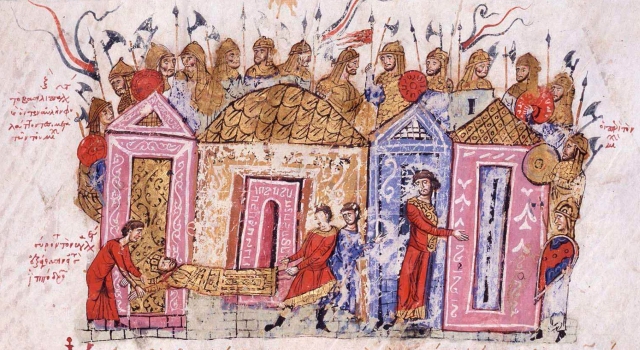Bolli: An Opportunistic Icelander, c. 1040
Bolli’s ax sat heavily on his shoulders, but he did not notice the weight. The emperor’s life-guard was back from Bulgar-fighting in Prilep and he was thinking about the new red cloak he would buy with the resulting wages and extra plunder. After purple, which no one besides the Grikkjakonungr and his family could touch, Bolli had decided that he liked red best. As he stood in line, arms displayed and shields clanking in turn, the garment began to come into focus.
People would come running when Bolli’s ship docked, whispering amongst themselves with jealous excitement and slighted awe. He would dress exclusively in fine furs and scarlet cloth, with large gold buckles glinting in the sunlight. It would be summer when he returned, and the sun would stay sitting, high in the heavens until the day was almost done, as if waiting for his triumphant return to set all his buckles and rings, weapons inlay and belt fastenings flashing. And then they would unload the ship and the precious metals and stones, the boxes stuck full to bursting with coins, and the silks with their saturated colors would dance, reflected in their wide and startled eyes. Or so went Bolli’s vision. In reality only his nose was in danger of turning red, and gradually it grew redder and redder under a more regular, if violent, sun.
Miklagard was worth the investment. Bolli had left home with plenty of funds, which were required to join any of the higher levels of the Greek military, including the emperor’s life-guards. Happily, fortune was smiling on him and with the latest campaign, he had begun to profit. Bolli heard from his fellow guards that in Norway and Sweden, they could not inherit while away, serving in Greece. On a certain level, he supposed he understood the sense of the regulation, but something about it stung him as patently unfair. Money was replaceable, and Bolli had little doubt he would return to Iceland far richer than his parents; nonetheless, the thought of losing family land or having an ancestral homestead pass to a more distant relative over such a trip was disconcerting.
Bolli gazed out over the neat ranks of soldiers, above the richly robed officials processing past, to the silhouetted towers against the sky, and the sea beyond, bluer than he had ever known blue could be. If he listened above the banging of shields and rapid Greek and Norse, Russian and Italian, Latin and English, and other languages he could not name, he could hear every kind of ship imaginable loading and unloading at the harbor below. The smells of spices and oils and drying grain from their cargos caught the draft and wafted upwards on a mercifully cool breeze. Bolli thought of the city’s stately public baths and chariot races. Both concepts were foreign and he had little enough time away from his duties as guard, but he had taken to them quickly, along with the boundless energy of the population for their institutions. He decided he would probably have gone to Miklagard anyway, even if it meant losing property at home.
Standing a row over from Bolli was a tall man, who towered over all the Greeks in the procession before them (and even over most of his fellow Varangians). This was their commander, Harald Sigurðarson himself. Bolli had great respect for the man, who, it was said, had been unjustly exiled from his native Norway. In Harald’s case, already deprived of his rightful inheritance, Bolli could well understand the decision to go east. He remembered making his own decision; his family had picked up and sailed to Iceland several generations earlier and he had reasoned that if they could do so and prosper well enough, he could certainly make his livelihood in Miklegard, at least for a few years.
Some of the guards occasionally discussed the rune stones they hoped their families would raise in their honor if they did not return home. Bolli had seen many memorials of the sort, especially during his travels throughout Sweden. He was initially optimistic enough to assume he would not be needing one himself, but composing hypothetical inscriptions made for good conversation, especially on long nights on campaign. After the recent fighting with the Normans in Italy where many of his countrymen had fallen, Bolli had begun to view his posthumous reputation in slightly more realistic terms. Death in battle was admirable, especially defending the emperor of so fine a city, but he still assumed he would live to flaunt his scarlet cloak and unload his ship of gold.
Harald did not speak of rune stones, though his companions often did. Some praised him for his stoic demeanor or credited his god-fearing resolve, and Harald did seem more inclined towards the city’s many churches than much of the other Northmen. Bolli, however, took his commander’s silence as proof of exile and royal ambitions. Perhaps Harald did not intend to die in battle at all. Perhaps any day he would take his wealth and leave in the dead of night to raise an army at home. It was whispered that he had already sent several shipments of gold to Prince Yaroslav in Kiev. Bolli had only heard such rumors from dubious sources, but saw nothing wrong with safeguarding one’s fortune in any case. He considered the feasibility of doing the same.
Brigid Ehrmantraut

Varangian guards. Madrid Skylitzes (Wikimedia Commons)

